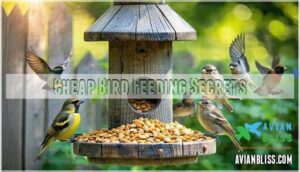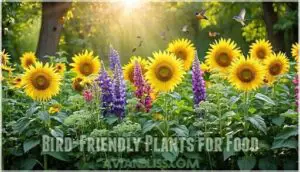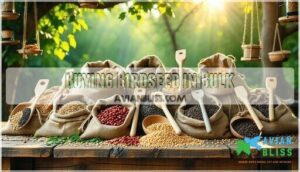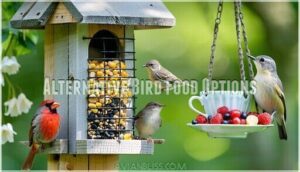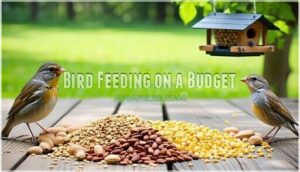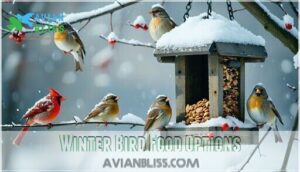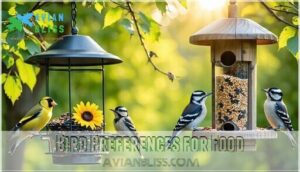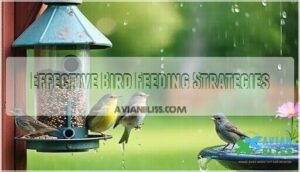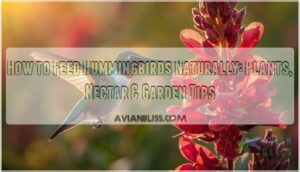This site is supported by our readers. We may earn a commission, at no cost to you, if you purchase through links.
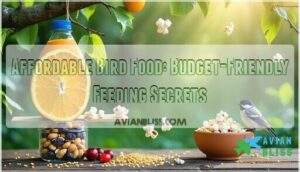
Start by using kitchen scraps like fruit peels or stale bread, which many birds love.
Don’t throw away bruised fruits, as they make nutritious treats.
Explore your pantry for grains such as cooked rice or oats that birds can enjoy without much fuss.
Buying birdseed in bulk is another smart move, since larger bags often cost less per pound.
And if you’re feeling crafty, consider making a feeder from a recycled bottle—birds won’t judge your creativity!
If you’re looking for an occasional treat to supplement your bird’s regular diet, consider air-popped, plain popcorn as a safe snack. Stick around for even more brilliant budget tips on keeping your feathered friends well-fed.
Table Of Contents
- Key Takeaways
- Affordable Bird Food Options
- Cheap Bird Feeding Secrets
- DIY Bird Feeders on a Budget
- Bird-Friendly Plants for Food
- Buying Birdseed in Bulk
- Alternative Bird Food Options
- Bird Feeding on a Budget
- Winter Bird Food Options
- Bird Preferences for Food
- Effective Bird Feeding Strategies
- Frequently Asked Questions (FAQs)
- What is the best food for birds?
- Is it cheaper to buy bird food at a local store?
- How do you feed birds cheaply?
- What is wild bird food mix?
- What is the cheapest thing to feed birds?
- How to make inexpensive bird food?
- How do you feed birds without going broke?
- What can I feed birds if I don’t have seed?
- How can I prevent birdseed from spoiling?
- What are the best times to feed birds?
- How do I store birdseed safely?
- Can homemade suet be frozen for later use?
- How can I attract specific bird species?
- Conclusion
Key Takeaways
- Use kitchen scraps like fruit peels, unseasoned rice, and leftover pasta to feed birds without spending extra money.
- Buy birdseed in bulk to reduce costs per pound and store it in cool, dry places to maintain freshness and avoid waste.
- Create DIY bird feeders using recycled materials like milk cartons and soda bottles to save money and add a personal touch to your garden.
- Choose high-quality seeds such as black oil sunflower seeds over mixes with fillers like milo to ensure birds get the nutrition they need.
Affordable Bird Food Options
Feeding birds doesn’t have to break the bank, as your kitchen, pantry, and garden hold a wealth of affordable options.
By using kitchen scraps like cooked rice and unseasoned pasta, offering damaged fruit, or providing pantry staples such as nuts and grains, you can create a diverse menu that satisfies a variety of bird species.
Kitchen Food Scraps for Birds
Ever wonder what’s safe to toss to the birds from your kitchen?
Using food scraps smartly can be both fun and helpful.
Try these options:
- Leftover pasta – safe and easy.
- Unseasoned rice – a great bread alternative.
- Vegetable peels – avoid attracting pests.
These bird-friendly foods offer simple, budget-friendly feeding.
Damaged Fruit for Birds
Kitchen scraps can save you cash and benefit the birds.
Instead of tossing bruised fruit, use it to enhance your feathered visitors’ diet.
Damaged fruit, like apples or bananas, offers a tasty treat and reduces fruit waste.
Simply place fruit in your backyard, letting birds enjoy fresh options.
A balanced diet including fresh fruits and vegetables, formulated diets, and seeds in moderation is essential for a bird’s overall health, as explained in detailed guides on what is healthy food for pet birds. This bird food alternative promotes a healthy, varied bird diet.
Pantry Bird Food Alternatives
When an apple starts to wrinkle, look to your pantry for bird food alternatives.
There’s more than you might think for a budget-friendly bird feeding feast.
Try these options to keep those feathered friends chirping happily:
- Chopped Nuts: Perfect pantry snacks for birds.
- Oatmeal: Simple and filling.
- Grated Cheese: A tasty treat.
Cheap Bird Feeding Secrets
You can make bird feeding affordable by avoiding milo in mixed seed bags, which most birds don’t eat, and by filling feeders with a single type of seed to reduce waste.
Buying hulled sunflower seeds in bulk will also save you money while keeping your feathered friends well-fed.
Avoiding Milo in Mixed Bird Seed
Affordable bird food often includes inexpensive fillers like milo, which most birds ignore.
Aim for healthier birdseed options without this filler.
Choosing quality seeds saves money and keeps feathered friends happy.
Here’s a quick guide:
| Ingredient | Quality Indicator |
|---|---|
| Milo | Often ignored |
| Sunflower seeds | Highly preferred |
| Economy wild bird seed | Check for fillers |
| Mixed birdseed | Avoid excess milo |
| Healthier choices | Sunflower over milo |
Filling Feeders With Single Seed Type
Think of your bird feeders as tiny restaurants.
Filling them with a single seed type, like black oil sunflower seeds or hulled sunflower seeds, attracts specific birds.
This simple strategy reduces wasted food and makes cleaning easier.
You’ll observe which seeds your feathered friends prefer, helping you tailor your offerings.
Consider millet, cracked corn, or peanuts for variety, but remember to clean your feeders regularly.
Buying Hulled Sunflower Seeds in Bulk
Buy hulled sunflower seeds in bulk, and you’ll save on bird food while enjoying some perks! Here’s how:
- Bulk Buying Benefits: Cut costs with larger purchases.
- Storage Tips: Keep seeds in cool, dry places.
- Seed Quality: Always check freshness and avoid fillers.
- DIY Seed Mixes: Combine with other seeds for variety.
This strategy will help you have happy, well-fed birds and a happy wallet!
DIY Bird Feeders on a Budget
You can transform everyday items like soda bottles, milk cartons, and toilet paper tubes into practical bird feeders without spending much.
By using recycled materials, you save money and also create a welcoming space for various bird species to enjoy.
Using Recycled Materials for Feeders
Let’s put some sprinkles of creativity into your bird feeding by using recycled materials for feeders, especially when paired with the right nesting materials like wood shavings for budgies.
You’ve probably got all you need around the house.
Turn that empty milk carton into a DIY birdhouse or repurpose old jars for birdseed mixes.
Upcycling saves money but also adds a touch of personality to your garden’s bird-friendly charm.
Making Quick Feeders From Household Items
Trimming expenses on feeders? With household items, you’ve got handy options.
Consider complementing your DIY feeders with affordable bird seed choices found online at cheap bird seed stores.
A milk carton morphs into a platform feeder, while peanut butter on a paper towel roll, coated in sunflower seeds or mealworms, provides a treat.
Quick crafts like this fit any bird feeding station setup.
Enjoy budget-friendly DIY feeders, transforming scraps into nourishing delights for feathered friends.
Bird-Friendly Plants for Food
You can create a bird-friendly haven in your garden by growing sunflowers, native flowers like coneflowers, and herbs such as dill and fennel, which provide nutritious seeds.
These plants attract a variety of colorful birds.
They also bring life and vibrancy to your outdoor space.
Growing Sunflowers for Bird Seed
Crafting a DIY birdhouse can be fun, but have you considered growing sunflowers for bird seed in your backyard?
These bird-friendly plants offer numerous benefits:
- Sunflower seed varieties: Choose types best suited to your climate.
- Planting timing: Sow seeds after the last frost.
- Sunflower care: Water regularly and provide full sun.
- Seed harvesting: Allow seeds to dry before storage for bird food.
Planting Native Flowers for Finches
Sunflowers aren’t the only seed-bearing plants finches love!
Coneflowers and other native seed-bearing flowers offer similar benefits.
Planting these attracts finches naturally, creating a finch haven in your yard.
These Finch-friendly flower types provide seeds, supplementing store-bought food.
Plus, native plants help the environment.
You’ll enjoy watching these delightful birds feast on the bounty you’ve provided.
Using Herbs for Bird Food
Growing herbs like lavender, mint, and dill in your garden isn’t just for seasoned chefs.
These natural bird treats, such as those found in lard-free bird seed balls made with peanut butter, offer natural bird food that many feathered friends adore.
Let some herbs go to seed, creating a buffet of bird-attracting herbs.
This approach provides essential winter bird seed and maintains vibrant biodiversity right in your backyard.
Buying Birdseed in Bulk
When you buy birdseed in bulk, you save money by choosing large bags of single seed like black oil sunflower seeds or nyjer.
Store the excess in a cool, dry place, and you’ll enjoy an affordable and efficient way to keep your feathered friends well-fed.
Opting for Large Bags of Single Seed
Buying birdseed in bulk can save money and reduce waste. You’ll enjoy the freedom of choice with single seeds like black oil sunflower or nyjer.
Here’s why it’s budget-friendly:
- Cost Savings: Large bags offer a lower price per pound.
- Customization: Mix your own blends.
- Consistency: Birds prefer familiar seeds.
- Availability: Fewer trips to the store.
Storing Excess Seed in Cool, Dry Spots
When you buy birdseed in bulk, storing it properly becomes essential.
Choose cool, dry spots to keep seeds fresh and pests away.
Using airtight containers helps maintain the seed’s shelf life by preventing moisture and humidity.
Consider exploring online bird food retailers for bulk purchasing options with quality and cost-effectiveness in mind.
This way, your bird food stays nutritious and spoilage-free, ensuring your feathered friends always have a reliable source of nourishment.
Alternative Bird Food Options
You can find budget-friendly options by using beef fat suet instead of cakes and crafting homemade nectar for hummingbird feeders.
You can also save money and support the environment by reusing and recycling old bird feeders.
This will also keep your feathered friends happy.
Using Beef Fat Suet Instead of Cakes
Birds love suet, and using beef fat instead of pre-made suet cakes can save you money while keeping them happy.
Beef fat, a rich energy source, is great for winter wildlife foods.
Try homemade suet recipes, and remember to store them properly to avoid spoilage.
Embrace this suet alternative and enjoy the cheerful visitors flocking to your yard.
Making Nectar for Hummingbirds
Creating your own hummingbird nectar is easy and economical!
Mix one part granulated sugar with four parts water, gently heating until the sugar dissolves.
Avoid using honey or artificial sweeteners; they’re harmful.
Never add red dye; it’s unnecessary and potentially toxic.
This DIY nectar recipe saves you money and guarantees your hummingbird feeders are filled with safe, delicious food.
Remember to change the nectar frequently to prevent spoilage.
Reusing and Recycling Bird Feeders
Hummingbird nectar’s done, now think about Earth’s friends.
Got old milk jugs or tin cans?
Consider a feeder with a no-waste hanging design.
Turn them into feeders with some clever, eco-friendly designs.
Embrace upcycling projects using recycled materials for smart bird feeder maintenance.
Fill with seeds, suet logs, or even bark butter.
It’s not just a DIY project; it’s a way to nurture freedom and safety for your feathered visitors.
Bird Feeding on a Budget
You can treat your backyard birds to nutritious pumpkin seeds, rich in vitamins and healthy fats learn more about pumpkin seeds for birds. You don’t need to break the bank to feed your backyard birds; savvy shopping can go a long way in making it affordable.
By looking for discounts and signing up for loyalty programs, you can keep feeders full without straining your budget.
Looking for Discounts and Sales
Switching from suet to seasonal sales can lighten your wallet’s load.
Keep an eye out for:
- Birdseed coupons: Snag them online or in-store.
- Seasonal sales: Stock up when prices drop, like holiday or end-of-season deals.
- Free materials: Check for future DIY feeder supplies.
These tactics bring freedom to your bird feeding budget, ensuring those winter birds get the best bird seed for winter.
Signing Up for Loyalty Programs
Signing up for loyalty programs can be a smart move for frugal bird enthusiasts.
You’ll earn benefits like points redemption and discount tracking, helping you save on seeds and bird supplies.
Store rewards can accumulate quickly, and comparing programs lets you maximize savings.
Use these loyalty perks to enhance your bird feeding tips, boost bird nutrition, and maintain thriving wild bird diets.
Scouring Curbsides for Free Materials
Uncover hidden treasures right outside your door for your feathered friends.
Explore curbsides to find materials for free bird feeders or even DIY bird baths.
Look out for:
- Pallets: Perfect for building innovative feeders.
- Discarded branches: Ideal for creating bird perches or toys.
- Old containers: Repurpose into food dispensers.
These small efforts can create a bird-friendly haven.
Winter Bird Food Options
When winter arrives, you need to provide birds with high-energy food to help them maintain warmth and energy.
Suet, bark butter, and hulled sunflower seeds are excellent choices that are both affordable and effective for attracting a variety of birds during the colder months.
Suet for High-Energy Bird Food
Several high-energy options exist for winter bird feeding. Suet, a rich fat source, provides essential calories. You can make your own suet recipes, offering control over ingredients. Proper suet storage is key to preventing spoilage.
| Suet Benefit | Suet Application |
|---|---|
| High in fat and calories | Directly to feeders |
| Attracts many species | Mixed with seeds |
| Easy to make | DIY suet recipes |
| Supplemental food | Use with seeds & water |
Remember, providing fresh water alongside suet enhances its effectiveness.
Bark Butter for Instant Feeding
Bark butter offers an easy solution for winter bird feeding, providing essential fats and nutrients.
Whip up your own with simple ingredients from home, ensuring a nutritious treat that’s hard for birds to resist.
Smear it directly on trees or feeders, creating an instant buffet.
Explore various bark butter recipes or consider other affordable alternatives for peak bird health and happiness.
Hulled Sunflower Seeds for Winter Birds
After spreading bark butter, you might wonder about other options for your feathered friends.
Hulled sunflower seeds are perfect for winter feeding.
They offer excellent bird nutrition without the mess.
Many birds, especially doves, also eat sunflower seeds whole, which provides them with extra nutrients.
Stock up by bulk buying and store seeds properly.
Keep these tips in mind:
- Choose quality seeds.
- Store in a dry place.
- Use rodent-proof containers.
- Monitor for mold.
- Rotate stock regularly.
Bird Preferences for Food
When you’re choosing food for your backyard birds, it’s essential to keep in mind their preferences to attract a variety of species.
Small birds like nyjer seeds, woodpeckers enjoy suet, and finches prefer hulled sunflower seeds, all offering nutritious options to keep your feathered friends returning.
Small Birds and Nyjer Seed
For those tiny, colorful finches fluttering around your garden, Nyjer seed is a top choice.
Typically served in specialized Nyjer feeders, this tiny, high-oil seed attracts vibrant finch flocks during winter feeding.
Consider your feathered friends’ seed preferences as you set up DIY feeders—this allows you to enjoy watching these delightful birds while keeping your budget intact.
Woodpeckers and Suet
Nyjer seeds aren’t just the favorites.
Woodpeckers love suet, a high-energy, fat-rich treat perfect for winter feeding.
You can whip up suet recipes at home or explore suet alternatives to keep these birds happy.
Consider crafting DIY suet feeders to enjoy watching their fascinating behavior.
This simple change makes your yard a haven for these vibrant avian visitors.
Finches and Hulled Sunflower Seeds
While woodpeckers create a racket enjoying suet, finches bring a gentler charm to your garden flocking to hulled sunflower seeds.
Consider shopping for affordable seed options at budget bird food.
These seeds are a top choice for finch feeding tips and, similar to mealworms, offer a high-protein food source ideal for breeding season, due to their ease of consumption and nutritional punch.
Consider mixing finch seed blends or crafting DIY finch feeders to enhance your yard’s appeal, especially during winter when food is scarce.
Effective Bird Feeding Strategies
You’ll find that smart feeding strategies have a big impact on your bird-feeding success and budget.
This includes offering only limited amounts of food to prevent waste.
Regularly maintaining your feeders and birdhouses is another key factor.
You can even team up with neighbors to buy birdseed in bulk for better prices.
Feeding Limited Amounts of Food
Imagine you’re hosting a bird banquet but want to avoid food waste.
Limiting portions can prevent overfeeding, ensuring food isn’t languishing uneaten.
For more affordable options, check out affordable bird feed.
Consider feeder size; smaller feeders naturally control portions, promoting bird health by discouraging overindulgence.
By managing the amount you put out, you save money but also keep your feathered guests fit and frequent.
Keeping Feeders and Birdhouses in Good Repair
A well-maintained feeder and birdhouse can mean the difference between a thriving birdwatching experience and a feeder full of dust.
Regular cleaning prevents bacteria, ensuring bird safety, while timely repairs extend their longevity.
Use mild soap for cleaning feeders, and check for loose nails in birdhouses.
Keeping everything in tip-top shape is the ticket to a bird-friendly backyard.
Joining Forces With Neighbors for Bulk Purchases
Pool resources with your neighbors for bulk birdseed purchases and reap more than savings.
Picture larger bags arriving at your doorstep, and enjoy quick tips:
Consider using high-energy options like black oil sunflower seeds, which are ideal for most birds when choosing the right birdseed for your balcony bird feeding setup.
- Neighborhood discounts can lower costs.
- Shared storage keeps excess seed fresh and accessible.
- Cost-sharing makes premium seeds affordable.
- Feeder variety caters to every bird’s taste.
Connecting with neighbors boosts your budget and bird variety!
Frequently Asked Questions (FAQs)
What is the best food for birds?
Picture birds happily chirping around feeders filled with black oil sunflower seeds, nyjer, and safflower.
Suet provides energy in winter, while unsalted peanuts and fresh fruits offer tasty treats.
Clean water completes their perfect buffet.
Is it cheaper to buy bird food at a local store?
Local stores often have sales, but bulk buying online might be cheaper. Check prices at both; compare unit costs to see which offers the best deal for your budget.
How do you feed birds cheaply?
Buy birdseed in bulk to save money.
Opt for high-value seeds like black oil sunflower or nyjer seeds and avoid mixes with fillers.
Recycle kitchen scraps like cooked rice or fruit, and provide homemade feeders from everyday items.
What is wild bird food mix?
Wild bird food mix can also be made at home with ingredients like oatmeal, offering a nutritious blend of oats, nuts, seeds, and dried fruit as seen in oatmeal bird food recipes. Wild bird food mix typically combines seeds like black oil sunflower, nyjer, and millet, appealing to various species.
Add nuts or dried fruit for larger birds.
Mixing your own can save money while providing specific nutrition.
What is the cheapest thing to feed birds?
Did you know nearly 50% of bird enthusiasts feed birds daily?
For an affordable option, try cracked corn.
It’s rich in carbohydrates, offers quick energy, and attracts a variety of birds, helping you save money.
How to make inexpensive bird food?
You can make inexpensive bird food using pantry staples.
Mix uncooked oatmeal, cracked corn, and chopped nuts.
Add dried fruits like raisins or berries for sweetness.
This blend provides birds with essential nutrients, ensuring they’re well-fed.
How do you feed birds without going broke?
Stretch your bird-feeding budget by buying birdseed in bulk, like black oil sunflower seeds, and mix your own blends.
Offer kitchen scraps, like cooked rice or cracked corn.
Reuse materials for homemade feeders to attract more birds.
What can I feed birds if I don’t have seed?
When life gives you kitchen scraps, feed them to the birds!
They’ll devour cooked rice, unseasoned pasta, chopped nuts, and bits of fruit.
Even grated cheese works.
Just steer clear of anything salty or spoiled.
How can I prevent birdseed from spoiling?
Buy birdseed in bulk, storing it in a cool, dry place.
Use airtight containers to keep moisture out, preventing spoilage and maximizing freshness for your feathered friends.
Smaller amounts spoil faster.
What are the best times to feed birds?
Morning and late afternoon are ideal times to feed birds.
They actively search for food during these periods, preparing for the day’s energy needs and nighttime roosting.
Make sure feeders are clean and stocked for your feathered visitors.
How do I store birdseed safely?
Store birdseed in a cool, dry place to prevent spoilage.
Use airtight containers like metal or heavy plastic bins to keep out pests.
Place containers off the ground and away from direct sunlight for best results.
Can homemade suet be frozen for later use?
Yes, you can freeze homemade suet to preserve its freshness for future use.
Just wrap it tightly to prevent freezer burn.
Then thaw it at room temperature before offering it to birds for their enjoyment.
How can I attract specific bird species?
Attract specific bird species by offering their preferred foods.
Use black oil sunflower seeds for cardinals, nyjer seed for finches, or suet for woodpeckers.
Provide fresh water, and place feeders in safe, accessible areas.
Conclusion
Imagine your backyard as a symphony, where each bird is a player and affordable bird food options are the notes that bring harmony.
By using kitchen scraps, damaged fruits, and bulk seeds, you’ve orchestrated a cost-effective feeding plan.
Choosing single seed types, making feeders from recycled materials, and planting bird-friendly plants enriches your avian symphony.
Explore bulk buying and savvy strategies to maintain variety without breaking the bank.
Your frugal efforts foster a vibrant, bird-friendly haven year-round.

